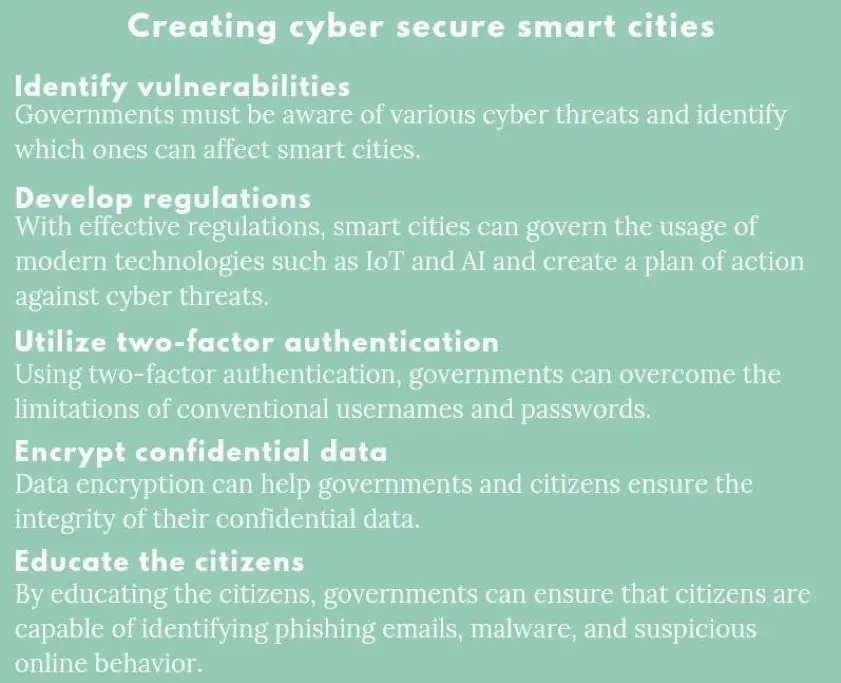Comments (4)
Alex Jones
Governments have to develop new regulations to protect smart cities
Chris Timmins
Smart cities have become an integral part of the modern ecosystem
Patrick White
How cool is that
Katie Goldsmith
Well explained

Government organizations and citizens share the responsibility of developing smart cyber secure cities by educating themselves about the various cyber threats to execute necessary risk mitigation strategies.
Smart cities across the globe have shown their incredible potential by decreasing traffic woes, conserving resources, and reducing pollution. However, smart cities are also among of the most attractive targets for high-profile cyber attacks. With the help of advanced cyber attacks, cybercriminals can steal confidential data, shut down access to essential resources, and gain illegal access to security cameras. Additionally, recovering from such attacks can prove to be expensive for smart cities. Hence, government organizations must take necessary steps that will facilitate protection from cyber threats to develop cyber secure smart cities.
Government organizations can implement the following steps to develop cyber secure smart cities: 
Millions of malware are developed every month and cyber threats such as phishing and ransomware are going to be more apparent in the next few years. Hence, governments must be aware of these cyber threats and identify which ones can affect smart cities. For this purpose, government organizations can collaborate with cybersecurity experts, who can help them understand the anatomy of a cyber attack and develop mitigation strategies. In this manner, government organizations can develop strategies for tackling various types of cyber threats and execute necessary measures to prevent them.
One of the most effective ways of creating cyber secure smart cities is developing regulations that can ensure data security and privacy. Smart cities in the US, Europe, Singapore, Australia, and many more countries have designed effective cybersecurity regulations to deal with cybersecurity issues. With sound regulations and policies, smart cities can govern the usage of modern technologies such as IoT, AI, and big data and create a plan of action against cyber threats. These regulations must also be updated regularly for adapting to evolving technologies, emerging cyber threats, and changing public perspective.
Online services such as digital identity, power management, water management, transportation apps, and security cameras must be secured with two-factor authentication. Two-factor authentication allows a system to verify a user’s identity with the help of user ID and password as well as a biometric input or one-time password. Using two-factor authentication, governments can overcome the limitations of conventional usernames and passwords. Hence, governments can prevent unauthorized access to essential services and confidential data with the help of two-factor authentication, leading to the development of cyber-secure smart cities.
Data encryption is one of the most effective methods of securing data. In encryption, confidential files can be secured by creating a cryptographic hash that can be verified only an authorized user’s public key. In case an attacker gains illegal access to encrypted data, they would be unable to decrypt, view, or alter its contents. Hence, data encryption can help governments and citizens in ensuring the integrity of confidential data.
Another significant aspect of creating cyber secure smart cities is educating leaders and citizens. By educating the citizens, governments can ensure that citizens are capable of identifying phishing emails, malware, and suspicious online behavior and executing mitigation strategies. Also, governments can inform citizens about online and offline practices that can protect them from cyber threats. In this manner, citizens will be able to stop cyber threats at their source.
Along with these steps, government organizations and cybersecurity experts have to develop prevention and mitigation strategies for automated cyber attacks. However, creating such strategies for automated and many other cyber threats can be a time-consuming and expensive task. Also, as cybercriminals start developing more advanced attacks, government organizations will need to deploy modern technologies such as AI and blockchain to create cyber secure smart cities.
Governments have to develop new regulations to protect smart cities
Smart cities have become an integral part of the modern ecosystem
How cool is that
Well explained
Naveen is the Founder and CEO of Allerin, a software solutions provider that delivers innovative and agile solutions that enable to automate, inspire and impress. He is a seasoned professional with more than 20 years of experience, with extensive experience in customizing open source products for cost optimizations of large scale IT deployment. He is currently working on Internet of Things solutions with Big Data Analytics. Naveen completed his programming qualifications in various Indian institutes.
Leave your comments
Post comment as a guest